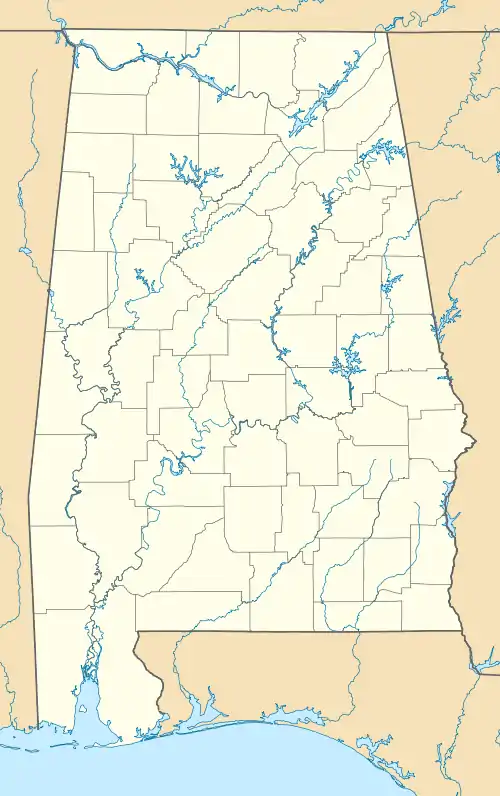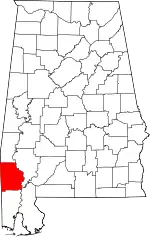Wakefield, Alabama
Wakefield is a ghost town in Washington County, Alabama, United States, most famous as the place where former vice president Aaron Burr was arrested in 1807.[1]
Wakefield, Alabama | |
|---|---|
 A 1904 photo of the place Burr was captured | |
 Wakefield, Alabama Location of Wakefield in Alabama | |
| Coordinates: 31°22′57″N 88°00′30″W | |
| Country | United States |
| State | Alabama |
| County | Washington |
| Time zone | UTC-6 (Central (CST)) |
| • Summer (DST) | UTC-5 (CDT) |
History
Wakefield was in a bend of the Tombigbee River near present-day McIntosh Bluff. The settlement was named by territorial judge Harry Toulmin after Oliver Goldsmith's novel The Vicar of Wakefield. Wakefield was the county seat of Washington County from 1805 to 1809.[2]
The arrest of Aaron Burr took place in February 1807. Fleeing from an arrest order issued by President Thomas Jefferson after being found innocent four times, on his way to Spanish West Florida, Burr was spotted by federal land agent Major Nicholas Perkins III[3] who reported the sighting to U.S. Army Lieutenant Edmund P. Gaines. Gaines arrested Burr on February 19 near Wakefield, two miles below Colonel Henson's,[4] and detained him at Fort Stoddert. Gaines and Perkins later testified at Burr's trial, which ended in acquittal.[5][6]
A marker placed by the Alabama Historical Association commemorates the Burr capture.[7]
References
- Nancy Isenberg, Fallen Founder: The Life of Aaron Burr (New York, 2007), p. 320
- Virginia O. Foscue, Place Names in Alabama (Tuscaloosa, 1989), p. 144
- "Aaron Burr's Arrest". Encyclopedia of Alabama. Retrieved June 8, 2023.
- Albert James Pickett, History of Alabama
- Stuart O. Stumpf, "The Arrest of Aaron Burr: A Documentary Record," Alabama Historical Quarterly (Fall & Winter 1980): pp. 113-23
- "The Project Gutenberg eBook of The Trial of Aaron Burr, by Joseph P. Brady". www.gutenberg.org. Retrieved June 8, 2023.
- Laura Hood, et al, Alabama Historical Association Markers (Bloomington, Indiana, 2006), p.317.
